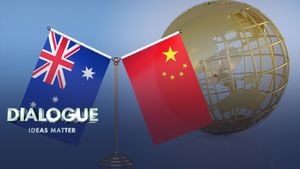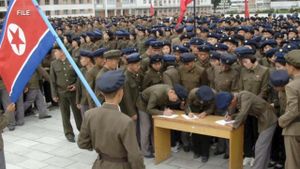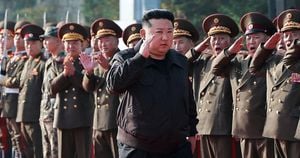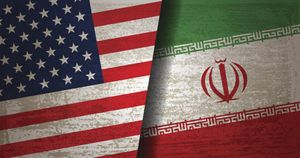The world is once again grappling with the shadows of nuclear conflict, as tensions simmer between the United States, North Korea, and other major powers. Recent discussions at the United Nations (UN) have reached fever pitch, particularly around proposals to study the effects of nuclear warfare and the ramifications of different conflict scenarios. Non-proliferation organizations are pressing the UK government to reconsider its alignment with countries like France, Russia, and North Korea as they prepare to vote against the creation of this pivotal study panel.
This upcoming vote has been orchestrated by Ireland and New Zealand, who are advocating for the formation of a group of scientific experts to explore the global impact of nuclear war. The discussions have piqued the interest of diplomats and observers alike, who anticipate overwhelming support for the resolution within the assembly. A unified stance from the UK alongside countries notorious for their nuclear ambitions—such as Russia and North Korea—could raise eyebrows and tarnish the UK's reputation amid its efforts to call out nuclear threats globally.
Arms control advocates have voiced their dismay over the current stance of the UK’s Labour government, which appears hesitant to break from its predecessors' policy. Patricia Lewis, head of the international security programme at the Chatham House think tank, expressed her frustration, noting, “People naively thought...with a Labour government, you would see a shift away from this kind of weird line.” Such sentiments underline the perceptions surrounding the Labour Party's approach to nuclear arms.
The proposed UN panel would represent the first comprehensive study since 1988 on the ramifications of nuclear conflict. This panel aims to provide timely insights, especially considering the rapid evolution of the global nuclear threat environment. Observers have pointed out the increasing collaboration between North Korea and Russia, prompting calls for updated assessments of nuclear threats.
Zia Mian, of Princeton University’s programme on science and global security, remarked on the potential motivations for the UK’s alliance with France and their collective stance against the resolution. He indicated, “I think this is building bridges with the French,” acknowledging the delicate nature of international relationships surrounding nuclear diplomacy.
There’s a palpable sense of urgency as the UK grapples with questions about its historical commitments and current policies on nuclear disarmament. Previous UN votes had seen the UK, along with Russia and North Korea, align against humanitarian initiatives related to nuclear testing impacts, demonstrating the complexity of the geopolitical climate.
Some voices within the arms control community remain hopeful, speculating if the Labour leadership could pivot their stance at the last moment. They argue passionately for the necessity of scientific research to build consensus and provide policymakers with reliable data. The proposed panel will analyze not only the physical aftermath of nuclear warfare but also societal consequences on local, regional, and even planetary scales.
Historically, the scientific community has warned of potential catastrophic results from nuclear conflicts. Scientists now assert it’s no longer just ‘superpower’ conflicts at stake; even limited nuclear exchanges could trigger devastating global effects. Mian noted, “They never imagined...the climate system was so sensitive to these kinds of effects.”
Reflecting on past scientific undertakings, the Royal Society of the UK, representing G7 nations, previously acknowledged the imperative role of the scientific community to communicate the catastrophic impacts of nuclear warfare. This highlights the intertwining of science and policy and the urgency for updated research.
Proponents of the resolution believe establishing this UN panel could create not just national but international consensus. They hope to emulate the success of bodies like the Intergovernmental Panel on Climate Change, which has proven influential at the policy level. Andrey Baklitskiy, from the UN Institute for Disarmament Research, underscored the potential for such studies to impact perception: “Studying the results of nuclear war will flesh out how bad it would be to have one.”
Similarly, major powers have had various diplomatic instances at play recently. Recently, Russia's top diplomat cautioned Western nations against opposing its nuclear capabilities, showcasing the high-stakes environment currently pervading diplomatic dialogues.
Alongside Russia's warning, the US and its allies are faced with growing concerns of other global players, such as China's military developments. Recent tests of intercontinental ballistic missiles (ICBMs) by China indicate their advancing capabilities and underline the urgent need for comprehensive discussions on nuclear arms previously assumed to be strictly tied to larger powers.
The rise of regional nuclear threats complicates the global stance on arms control. Leaders across various nations are starting to see the scale of nuclear capabilities grow beyond traditional powers, as nations like North Korea continue to assert themselves militarily.
Given the complex interplay between global powers and the persistent realities of nuclear armament, the upcoming UN discussions reflect broader anxieties around nuclear conflict. Each move at the assembly could ripple outward, influencing global diplomatic strategies and potentially redefining future policies concerning nuclear arms.
Now, as the UK faces pressures not only from international observers but also domestic advocacy groups, officials are contemplating their next steps. On one hand, the allure of maintaining strong ties with nuclear states like France and the need to uphold legacy policies can draw countries down paths they might choose to avoid. Confronted with public and scientific sentiment, the big question remains—could this be the moment the UK recalibrates its approach to nuclear policy?



